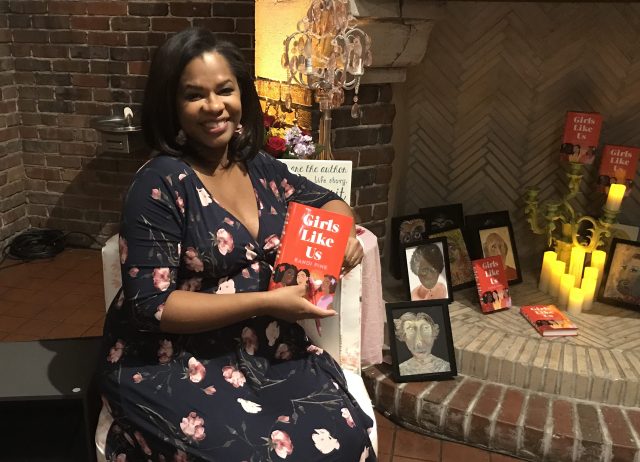
By Javacia Harris Bowser
For The Birmingham Times
Birmingham author Randi Pink wrote her latest novel Girls Like Us in 31 days.
No, she wasn’t trying the National Novel Writing Month challenge. She was angry.
“I call it ‘rage writing,’” Pink said. “I felt history was about to repeat itself.”
Girls Like Us, a young adult novel that hit bookshelves on October 29, is set in 1972 – one year before Roe v. Wade, the landmark U.S. Supreme Court decision that legalized abortion. The story follows four teenage girls dealing with unplanned pregnancies.
Pink,36, got the idea for the novel when Donald Trump was elected president in 2016.
“I kind of sensed that his election meant that Roe would be in jeopardy,” Pink said.
But she didn’t write the book in 2016. She typed a few notes for Girls Like Us in the notes app of her cell phone and tucked them away.
In 2018, during the confirmation hearings of now U.S. Supreme Court Justice Brett Kavanaugh, Christine Blasey Ford came forward with sexual assault allegations against Kavanaugh. Pink knew it was time to bring the story of Girls Like Us to life.
“I saw Blasey Ford speak sincerely and nervously,” Pink said. “I saw a lot of myself there. I think a lot of women did. And then I saw [Kavanaugh] speak with authoritative, powerful aggression. Throughout my life I’ve seen those voices rise to the top. Women’s voices are not taken as seriously. I was so angry that it was either throw dishes at the wall or write a book.”
Pink’s book is especially timely with the passing of Alabama’s Human Life Protection Act, which calls for a sweeping ban of abortion and threatens doctors who perform the procedure with felony charges and up to 99 years in prison.
“There has never been a more important time for a book like this,” Jenna King-Shepherd, Alabama State Director of Planned Parenthood Southeast, said of Pink’s novel. “It reminds us of what the future could be if we do not take a stand. The title itself speaks to the de-stigmatization of abortion and a person’s right to choose. It reminds all who have chosen abortion, chosen to parent and chosen to adopt that there are other ‘Girls Like Us’ out there.”
On the day of Pink’s book release, a federal judge blocked the ban from taking effect, ruling it unconstitutional.
“It’s encouraging that a judge would be brave enough to strike that, but it’s also a part of the plan of the people who are trying to ultimately take down Roe V. Wade,” Pink said. “Part of the plan is to take it further up to the Supreme Court, so I was happy at the bravery, but the celebration was limited.”
Girl Talk
Girls Like Us follows the stories of Ola, Izella, Missippi, and Sue. Ola and Izella are sisters who live in rural Georgia.
Pink described 16-year-old Ola as a “Dorothy Dandridge beauty” who’s in love with a young man who has just returned from the Vietnam War. When she finds out she’s pregnant, she leans on her younger but wiser sister Izella for help.
In the same Georgia town, readers meet 14-year-old Missippi. Pink described her as “an innocent.” Missippi’s mother died early in her life and her father is a long-haul truck driver.
“She’s left alone with her dolls and her Bible in her small house,” Pink said. “She’s adorably clueless but prey for what she calls ‘nasty men,’” which leads to her pregnancy.
“I cried in the private room of Emmet O’Neal Library [in Mountain Brook] while writing Missippi,” Pink said. “I wanted to send her a hero, a Wonder Woman, but I couldn’t because that wouldn’t be fair to the reader.”
Pink said she immediately thought of Missippi when Alabama’s abortion ban, which would restrict abortions in the case of incest and rape, passed earlier this year.
“She’s a fictional character but those girls exist in the world today,” Pink said. “And this law comes through and it just felt like we’re going right back to 1972.”
And then there’s 17-year-old Sue who lives in a wealthy suburb of Chicago. The daughter of an anti-choice senator, Sue is a free spirit, Pink said, who plays guitar, loves Joni Mitchell, and hates the Vietnam War.
“She’s a flower child,” Pink said. “And she has sex with a cute boy and gets pregnant.”
Pink said she tries not to anticipate what her readers will take away from her work, but she does hope young girls will come away with at least one piece of advice.
“Talk to your mothers and your grandmothers,” Pink said. She added that she believes many adolescent girls lack an understanding of what a healthy sexual relationship looks like because pornography is so readily available while sex education programs are leaving many schools. So, Pink hopes her book will spark conversations about sex between daughters and mothers and grandmothers, regardless of how uncomfortable those talks may be.
Write Out Loud
Pink, who grew up in Titusville and Homewood, found her voice through writing.
“I grew up in a loud rambunctious family and I was in the corner just listening and I never spoke up,” she said. “I always just observed, but that wasn’t because I never had anything to say. It was like the words would get stuck between my heart and my mouth and I couldn’t get them out. The only way I could get them out was by writing them down.”
When she was around 18, she got hooked on online chat rooms.
“It was the perfect way to connect with the outside world without having to speak my words,” Pink said. “I realized I could write and I didn’t have to speak. I could write and still connect with people.”
As much as Pink loved writing, the idea of being a published author felt like a pipe dream.
“I didn’t think it was possible,” she admitted. “A black girl from Birmingham, I didn’t think publication was a thing for me.”
But in September of 2016, Pink’s debut novel Into White was released.
Also young adult fiction, Into White follows LaToya Williams, a black teenage girl who attends a predominantly white high school in Montgomery, Alabama and has trouble fitting in. One night she prays to a higher power to make her “anything but black” and wakes up the next day white, blond, and popular.
“I call it my Drano novel,” Pink said. “It cleared the clog and cleared the way for everything else. It was terrifying because Toya, more than any other character I’ve written in my life, was probably closest to me in that I grew up hating myself.”
So, she ran away from this novel, Pink said.
“I ran away from writing it. I ran away from editing it. I ran away from publicizing it and I closed all social media when it came out,” Pink explained.
Pink said she wrote her latest novel with more confidence.
“I know what I’m doing now,” Pink said. “When writing Toya I felt like in some way I was nude. I was stripped down to nothing for so long that now I’m comfortable with my nakedness. I’m not running away Girls Like Us.”
Learn more about Randi Pink and her new novel Girls Like Us at randipink.com.



